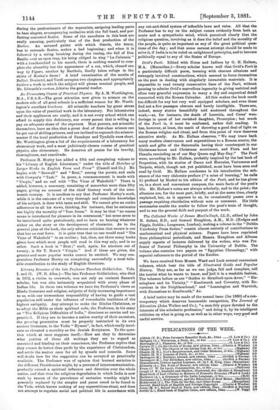Literary Remains of the late Professor Theodore Goldstileker. Vole. I.
and II. (W. H. Allen.)—The late Professor Goldstiicker, who died in 1872, a victim to overwork, was not only an eminent Sanscrit scholar, but was also intimately acquainted with every phase of Indian life. In these two volumes we have the Professor's views on Hindu literature and religion, subjects of daily-increasing importance to us, with our tremendous responsibility of having to guide a vast population still under the influence of remarkable traditions of the highest antiquity. Any attempt to make the Hindus Christians, or to adopt the Bible as their spiritual code, the Professor, in his essay on "The Religious Difficulties of India," dismisses as unwise and un- practical. If they are to become a nation worthy of their ancestors, the growing generation must be properly instructed in its own ancient literature, in the Vedic "Hymns", in fact, which really incul- cate as elevated a morality as the Jewish Scriptures. To the ques- tion which at once suggests itself,—How are they to determine what portion of these old writings they are to regard as canonical and binding on their conscience, the Professor replies that they cannot do better than profit by the experience of Christendom, and settle the matter once for all by synods and councils. Some will doubt how far the suggestion can be accepted as practically available. The Professor was of opinion that learned societies in the different Presidencies might, by a process of intercommunication, gradually extend a spiritual influence and direction over the whole nation, and that thus the religions degradation in which India is now sunk by reason of the prevalence of sectarian worship might be generally replaced by the simpler and purer creed to be found in the Veda, which knows nothing of any superstitious ritual, and does not attempt to regulate social and political life in accordance with
any cut-and-dried system of inflexible laws and rules. All that the Professor has to say on the subject comes evidently from both an acute and a sympathetic mind, which perceived clearly that the religious question, involving as it does the belief and the morality of the people, is quite as important as any of the great political ques- tions of the day ; and that some earnest attempt should be made to solve it, if India is to be ruled on enlightened principles, and to become politically equal to any of the States of Europe.


































 Previous page
Previous page